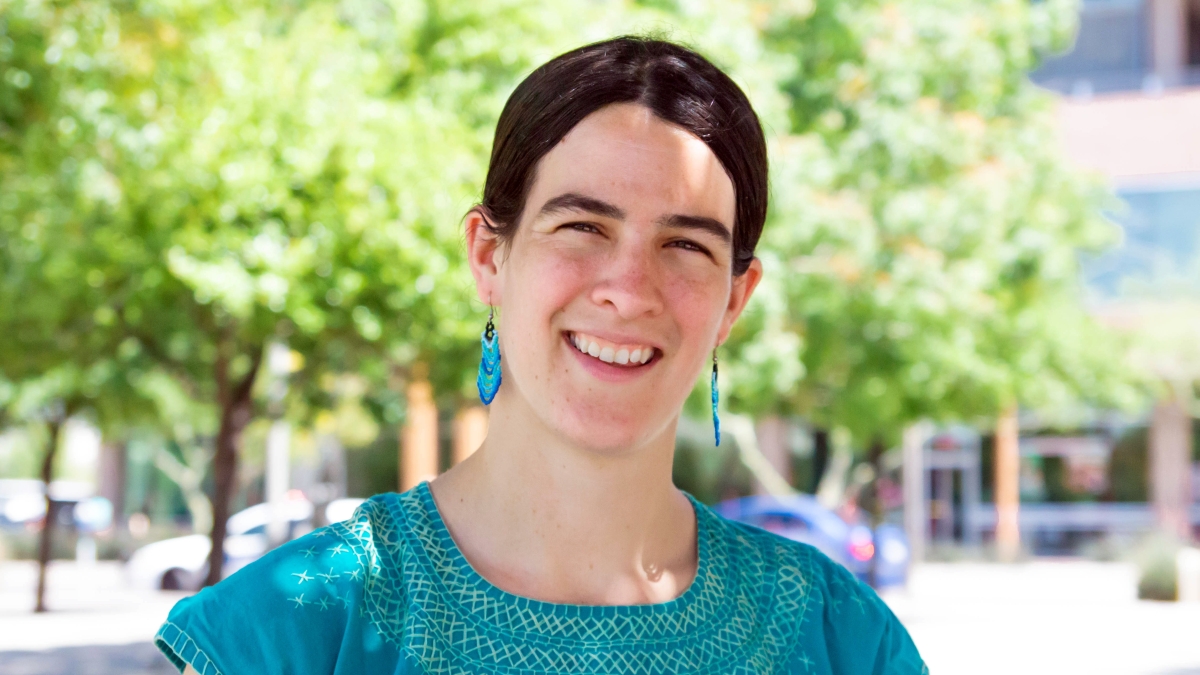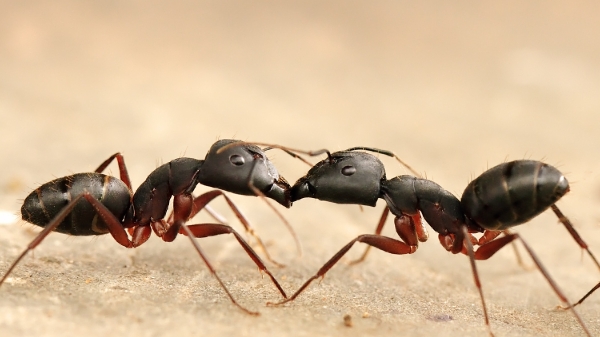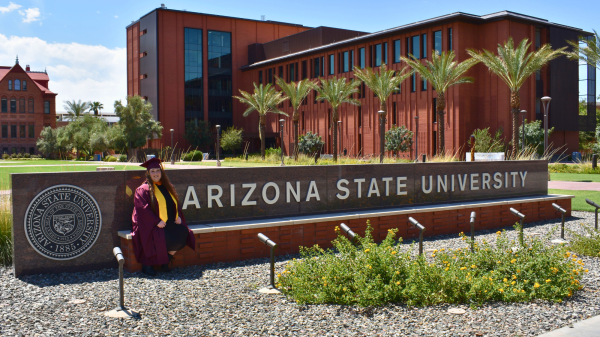On the border, grad hopes to make a difference in immigration policy

Joanna Williams, who is building a national reputation for her scholarship and fieldwork on migration, is the spring 2019 outstanding graduate for the School of Public Affairs in Watts College of Public Service and Community Solutions. Photo by Alexis Bojorquez
Editor’s note: This is part of a series of profiles for spring 2019 commencement.
Joanna Williams didn’t travel lightly on her purposeful journey to earning a master’s degree in public policy, and she’s leaving Arizona State University with more than a diploma. The director of education and advocacy at the Kino Border Initiative (KBI) said she now has greater means to promote policies that respect the rights and dignity of migrants.
“I’ve seen through my master’s all the tools and best practices and other dimensions I think we can apply to our advocacy,” Williams said. “I’m really excited to implement that at KBI.”
Williams, who is building a national reputation for her scholarship and fieldwork on migration, is the spring 2019 outstanding graduate for the School of Public Affairs in Watts College of Public Service and Community Solutions.
KBI is a binational organization on the U.S.-Mexico border that serves deported migrants and asylum seekers through humanitarian aid, education, research and advocacy. Williams, who has practiced empathy for migrants since her childhood days in Denver, joined the staff in 2015. She has gotten to know people at different stages in their journey both in the United States as well as at the border.
“I care really deeply about them as friends and neighbors and brothers and sisters,” she said.
Williams first arrived at the U.S.-Mexico border by way of Georgetown University, where she first learned about the Kino Border Initiative as an undergraduate student in 2010. Georgetown sponsored her on a weeklong KBI immersion program.
She went to Georgetown with thoughts of becoming an immigration lawyer. But a career at the border held more appeal than a career in a Washington, D.C., office. She said a mentor told her there was nothing wrong with going to the border and loving people there. Her career focus shifted from becoming a lawyer who upholds laws to a position with an opportunity to influence the making of policy and laws.
For Williams, to spend time doing something other than concentrate on her work at KBI, ASU had to offer something special, and it did. She said she leaves the program with a better understanding of policy analysis and the political calculations in developing policy alternatives. That’s especially helpful on a subject as intense as immigration, she said.
Williams brought to the master’s program her life experiences of growing up in Denver attending school with children of immigrants from Mexico, coming of age as a high school volunteer teaching English to refugees and several years of scholarly work on immigration issues in Mexico and Central America, including stints as a Truman and Fulbright scholar. At ASU, she was a Barrett Endowed Scholarship recipient.
Completing course credits for her master’s degree involved at least 150 hours commuting to Phoenix from her home in Tucson and her work in Nogales, Arizona, and Nogales, Sonora, Mexico. There was also the challenge of balancing a demanding job with the commitments of graduate study. The past two years have been exhausting, but she said appreciates the dialectic between the intensity of her work and school, where she had time to “reflect and think more deeply.”
In graduate school, she continued her history of producing results from solid research. She was part of an independent study that developed orientation materials in a train-the-trainer model, which helps information about asylum reach people while they are still in Central America. The initiative provides the information before potential migrants invest significant financial resources and puts their lives in danger to reach the border.
Williams said she also enjoyed global development courses that informed her thinking about bigger-picture issues surrounding the movement of people.
“I believe that global development, especially from the perspective of business and sustainable industries, is critical to addressing the root causes of migration,” Williams said. “In a similar vein, scientific research in areas of sustainability and climate change is an important piece of addressing these challenges.”
Earning her master’s degree may conclude Williams’ robust research career. Her focus now is on carrying out the vision of KBI. While that, no doubt, will require additional research, Williams says she now sees herself in different roles.
“Maybe I’m not a researcher who’s carrying out the whole project, but I can set some of those visions and manage a bit of the research,” Williams said. “I think there’s a lot that we don’t know, and that information can help us better understand the implications of policy, better understand the options for support.”
Earning her master’s degree to advance her life’s work also is in keeping with Williams’ personal quest to be “grounded by the commitment to be humbly growing in love.”
“People throw out the word 'love' a lot, in a casual sense,” Williams said. “What I’ve really come to understand is the commitment and responsibility that comes with love. Love is much more than an emotion. It’s a dedication to somebody’s well-being. I’m still trying to figure out what that looks like.”
Story by Jennifer Dokes
More Sun Devil community

Army veteran dedicates PhD to exploring the social order of ant colonies
While Colin Lynch was enlisted as a medic in the National Guard, he had a pastime that was quite different from that of his peers…
College of Health Solutions grad, soccer star hopes to make the big leagues
A staple lineup defender on the Sun Devil women’s soccer team, Lauren Kirberg is looking to join the National Women’s Soccer…

ASU grad finds her calling in advocating for people through clinical research
Rhiannon Elliott-McGaugh-Mask grew up hundreds of miles away from an ocean, but that wasn’t an issue when deciding her future…